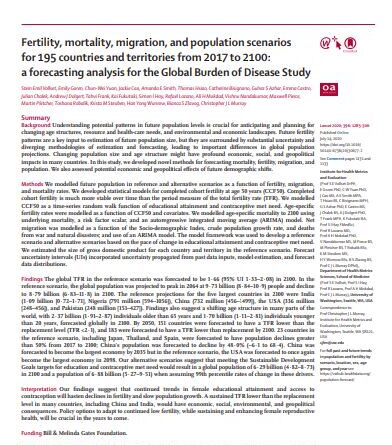22Mar
By Prof Stein Emil Vollset, DrPH, Emily Goren, PhD, Chun-Wei Yuan, PhD, Jackie Cao, MS, Amanda E Smith, MPA, Thomas Hsiao, BS, Catherine Bisignano, MPH, Gulrez S Azhar, PhD, Emma Castro, MS, Julian Chalek, BS, Andrew J Dolgert, PhD, Tahvi Frank, MPH, Kai Fukutaki, BA, Prof Simon I Hay, FMedSci, Prof Rafael Lozano, MD, Prof Ali H Mokdad, PhD, Vishnu Nandakumar, MS, Maxwell Pierce, BS, Martin Pletcher, BS, Toshana Robalik, BSc, Krista M Steuben, MS, Han Yong Wunrow, BSc, S Zlavog, BS & Prof Christopher J L Murray, DPhil
Understanding potential patterns in future population levels is crucial for anticipating and planning for changing age structures, resource and health-care needs, and environmental and economic landscapes. Future fertility patterns are a key input to estimation of future population size, but they are surrounded by substantial uncertainty and diverging methodologies of estimation and forecasting, leading to important differences in global population projections. Changing population size and age structure might have profound economic, social, and geopolitical impacts in many countries. In this study, we developed novel methods for forecasting mortality, fertility, migration, and population. We also assessed potential economic and geopolitical effects of future demographic shifts.
Get the report here
© Copyright 2021. Todos los derechos reservados. Diseño y Desarrollo por RayónGDL











